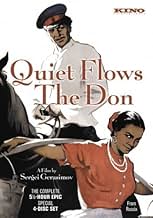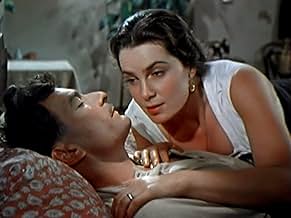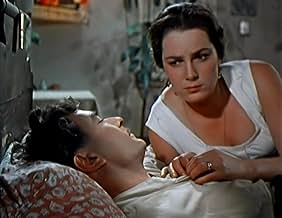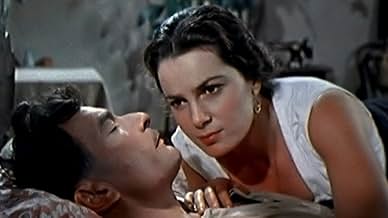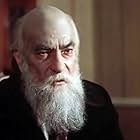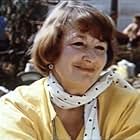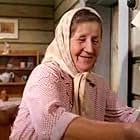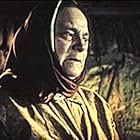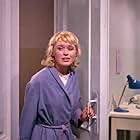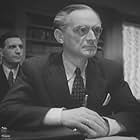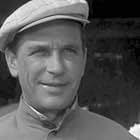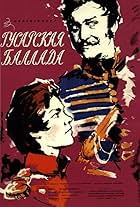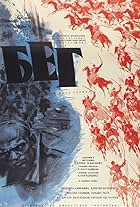IMDb RATING
7.7/10
1.4K
YOUR RATING
An epic story of shattered lives of the Don Cossacks through chaos of World War I, the Russian Revolution, and the following Civil War.An epic story of shattered lives of the Don Cossacks through chaos of World War I, the Russian Revolution, and the following Civil War.An epic story of shattered lives of the Don Cossacks through chaos of World War I, the Russian Revolution, and the following Civil War.
- Director
- Writers
- Stars
- Awards
- 1 win total
Daniil Ilchenko
- Panteleimon Prokofyevich Melekhov
- (as D. Ilchenko)
Anastasia Filippova
- Ilyinichna - maty
- (as A. Filippova)
Pyotr Glebov
- Grigoriy Melekhov
- (as P. Glebov)
Nikolai Smirnov
- Pyotr Melekhov
- (as N. Smirnov)
Lyudmila Khityaeva
- Dariya - zhena Melekhova
- (as L. Khityayeva)
Natalya Arkhangelskaya
- Dunyashka Melekhova
- (as N. Arkhangelskaya)
Aleksandr Blagovestov
- Stepan Lekatov
- (as A. Blagovestov)
Elina Bystritskaya
- Aksiniya
- (as E. Bystritskaya)
Aleksandr Zhukov
- Miron Koshevoy
- (as A. Zhukov)
Aleksandra Denisova
- Lukinichna
- (as A. Denisova)
Zinaida Kirienko
- Natalya Melekhova
- (as Z. Kiriyenko)
Boris Novikov
- Mitka Korshunov
- (as B. Novikov)
Aleksandr Karpov
- ded Grishaka
- (as A. Karpov)
Yelena Maksimova
- maty Koshevogo
- (as Ye. Maksimova)
Gennadi Karyakin
- Mikhail Koshevoy
- (as G. Karyakin)
Valentina Khmara
- Mashutka Koshevaya
- (as V. Khmara)
Pyotr Chernov
- Ilya Bunchuk
- (as P. Chernov)
- Director
- Writers
- All cast & crew
- Production, box office & more at IMDbPro
Featured reviews
SYNOPSIS The lives and loves of Russian Cossacks living on the eastern steps of Russia during the Russian Revolution.
CONCEPT IN RELATION TO THE VIEWER How events beyond our control and the judgment of others shape our lives in the long term. No matter how hard we try, sometimes fate controls our destiny.
PROS AND CONS This is a great film, not because of it's acting or screenplay, but because it shows the western world that there were important events in the past that we have little knowledge of. It opens a doorway to us that we never knew existed and lets us glimpse some of the reasons that others think differently than we do.
During the late 1950 the Soviet Union was keen to copy everything that the west did regarding popular culture to show that they could do it just as well as the Americans and the Europeans. They sort of had a chip on their shoulder and wanted to prove that they were good enough to run with the big boys. In response to films such as "Ben Hur" and "Gone With The Wind", they geared up their own state sponsored film industry to produce 'epics'. This is one of them. Five and a half hours of the Russian experience in grand scope and scale.
Some have said that this is the Russian version of "Gone With The Wind", but it is more closely tied to "Dr. Zhivago" in theme and tone. The film deals with a portion of history rarely seen in the west. The internal struggles of a nation in the midst of Civil War in what could best be described as the Wild West of Russia.
This film is long with slow pacing. Russian cinema does not move a story along at a fast pace. Characters are built slowly and relationships between them are complex and wide ranging. The scenery is beautiful but sparse, as befits the Russian hinterlands. This is mostly a rural 'people' film, without much else to distract the audience, such as machinery or large scenes in cities. It is intimacy played out on a very broad canvas.
One of the more peculiar things about this version of the film is the narration. The film is shown in it's original language with no subtitles. The characters are narrated, not voiced over. So when someone speaks, it is in their native tongue, and then an English voice speaks what they are saying, sort of like you are reading their mind in delayed time. It preserves more of the feel of the film, but takes a little getting used to.
The other thing that was noticeable about the film was the Foley work. Sounds such as breaking glass or gun shots were VERY loud and distracted from the film at times. In a fist fight early in the film, the sounds of fists hitting the actors faces sounded like a sack of rice dropped from two stories up and hitting a wooden floor.
Unless you watch this film very closely, without distraction, it is easy to get lost in the complexity of the story. I was often left wondering who were the Reds (Communists) were and who were the Whites (Loyalists) and who was fighting whom. This film assumes that the audience has a good understanding of this time in Russian history, much like most American audiences have a good understanding of who Benjamin Franklin and Paul Revere were.
What this film left me with was a better understanding of the mind set of the Russian people and how they perceive their world and their place in it. They are pragmatic for a reason and see the journey of life as a hard and difficult thing. There is no "pursuit of happiness" in their character. There is only finding happiness where it lays and enjoying it while you can.
CONCEPT IN RELATION TO THE VIEWER How events beyond our control and the judgment of others shape our lives in the long term. No matter how hard we try, sometimes fate controls our destiny.
PROS AND CONS This is a great film, not because of it's acting or screenplay, but because it shows the western world that there were important events in the past that we have little knowledge of. It opens a doorway to us that we never knew existed and lets us glimpse some of the reasons that others think differently than we do.
During the late 1950 the Soviet Union was keen to copy everything that the west did regarding popular culture to show that they could do it just as well as the Americans and the Europeans. They sort of had a chip on their shoulder and wanted to prove that they were good enough to run with the big boys. In response to films such as "Ben Hur" and "Gone With The Wind", they geared up their own state sponsored film industry to produce 'epics'. This is one of them. Five and a half hours of the Russian experience in grand scope and scale.
Some have said that this is the Russian version of "Gone With The Wind", but it is more closely tied to "Dr. Zhivago" in theme and tone. The film deals with a portion of history rarely seen in the west. The internal struggles of a nation in the midst of Civil War in what could best be described as the Wild West of Russia.
This film is long with slow pacing. Russian cinema does not move a story along at a fast pace. Characters are built slowly and relationships between them are complex and wide ranging. The scenery is beautiful but sparse, as befits the Russian hinterlands. This is mostly a rural 'people' film, without much else to distract the audience, such as machinery or large scenes in cities. It is intimacy played out on a very broad canvas.
One of the more peculiar things about this version of the film is the narration. The film is shown in it's original language with no subtitles. The characters are narrated, not voiced over. So when someone speaks, it is in their native tongue, and then an English voice speaks what they are saying, sort of like you are reading their mind in delayed time. It preserves more of the feel of the film, but takes a little getting used to.
The other thing that was noticeable about the film was the Foley work. Sounds such as breaking glass or gun shots were VERY loud and distracted from the film at times. In a fist fight early in the film, the sounds of fists hitting the actors faces sounded like a sack of rice dropped from two stories up and hitting a wooden floor.
Unless you watch this film very closely, without distraction, it is easy to get lost in the complexity of the story. I was often left wondering who were the Reds (Communists) were and who were the Whites (Loyalists) and who was fighting whom. This film assumes that the audience has a good understanding of this time in Russian history, much like most American audiences have a good understanding of who Benjamin Franklin and Paul Revere were.
What this film left me with was a better understanding of the mind set of the Russian people and how they perceive their world and their place in it. They are pragmatic for a reason and see the journey of life as a hard and difficult thing. There is no "pursuit of happiness" in their character. There is only finding happiness where it lays and enjoying it while you can.
Beautiful film and well-acted in a theatrical style that is common of many older Russian films. The story is long and involved, and an American audience will likely wonder what the point of the first 1/3 of the movie is about. As described by another, that portion of the film seems very much like a soap opera concerned with who is sleeping with whom. More importantly is how the scandal plays out in the families and village and how the characters are trapped within their lives, culture, communities, and expectations.
Americans and other westerners might also be surprised by the 2nd part of the film, which depicts the Bolshevik victory as far from certain, often challenged, with parties changing sides and allegiances as the war weary citizens fight on through tragedy after tragedy.
Overall, it's a brilliant film ... a technical and cinematic achievement, for sure. Comparisons to "Gone with the Wind" are entirely appropriate .. however, it is a "Gone with the Wind" with muscles, with combat, with blood, with real tragedy.
Americans and other westerners might also be surprised by the 2nd part of the film, which depicts the Bolshevik victory as far from certain, often challenged, with parties changing sides and allegiances as the war weary citizens fight on through tragedy after tragedy.
Overall, it's a brilliant film ... a technical and cinematic achievement, for sure. Comparisons to "Gone with the Wind" are entirely appropriate .. however, it is a "Gone with the Wind" with muscles, with combat, with blood, with real tragedy.
This is one of those movies which would haunt you again and again after you watched it once. And more over -- the more you watch it the more you find something new about yourself,people and life. Thikhiy Don depicts life of two -- man and woman, their love, their hardships, their fight for their love and all this happens against the backdrop of a wide picture of life of the whole country during a very dramatical and crucial period of Russia, including WW1, civilian war,and a lot of others events. I don't know another movie where love was depicted so sincerely and so nicely as it was done here. Petr Glebov and Elina Bystritskaya not played they lived on the screen, as did the love of their heroes. The movie turned out to be very realistic, with big respect for details. Before the movie was set out actors lived several months at the khutor where events of the book really took place. A lot of beautiful Russian actors performed in this movie, each performance is a little masterpiece. The music was written by Yuriy Levitin, one of the best follower of Shostakovitch and it matches the movie very well. The director did a superb job, there are no details missed in this movie, all was in check by director, even the river itself which gave the name to the whole thing was one of the actors -- Don i mean. In my opinion it is one of the best movie made in the 20 th century. Some people could compare it with 'Gone with the wind'but i appreciate it much higher. I rate it 10.
This is how old time well done propaganda was made, with emotion, with history, with characters wearing their hearts on the outside, with a story that binds the good and the bad in myriad ways, taking the viewer through all the mistakes one could think of doing in relationship with challenging the totalitarian party, and then learning how the "right ways".
The story feels real, even though, for myself, coming from a communist country, it is clearly plastic fantastic, but it represents the idealistic expectations of how to have the community behave in relationship to the party ideals.
All in all, one should watch it, immerse in it, but not lose the sight of a propaganda product. But very well done.
The story feels real, even though, for myself, coming from a communist country, it is clearly plastic fantastic, but it represents the idealistic expectations of how to have the community behave in relationship to the party ideals.
All in all, one should watch it, immerse in it, but not lose the sight of a propaganda product. But very well done.
This is a 6 hour flick of three episodes.
1 Pre WW1, the way of life,the lives and loves
of the rural Cossack village.
2 Mobilization, WW1, defeat
3 The end of WW1, revolution,chaos, civil war, changing fortunes, Bolshevik Victory. The turbulence of Cossack life during this time.A bit of propaganda,but who cares?
This is the Russian Gone With the Wind.As good and maybe better. A vanished world. I had
seen it before,but this adaptation was better.Maybe the other was edited different or the subtitles are better? The flow of the story was better.Several characters from the home village appear again and again during the film. The main character is Grigory, a young rather wild Cossack, his next door married lover, his family selected wife.His large family gets a lot of time in this.A rather boring life is soon interrupted by war,revolution,counter revolution , Bolsheviks, white Russians,bandits and Communists. As things change, Grigory switches sides, his family and the Cossacks way of life is ruined. He loses everything. Well filmed,well acted,excellently scored, a cast of thousands.A classic Russian epic. Well worth watching. Epic War, history and love.You can't beat the combination.
Storyline
Did you know
- TriviaOriginal Russian film is 340 minutes long (film length 9,582 m). It was reduced to 107 minutes for international distribution.
- ConnectionsFeatured in Zhizn odna... (1987)
- How long is Quiet Flows the Don?Powered by Alexa
Details
- Runtime5 hours 30 minutes
- Sound mix
- Aspect ratio
- 1.37 : 1
Contribute to this page
Suggest an edit or add missing content



